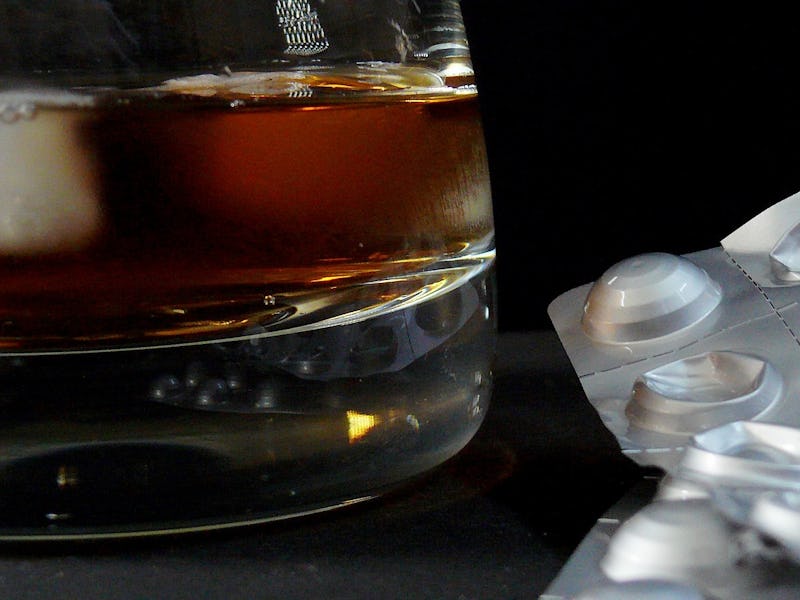Alcoholism Pill Eludes Scientists, But Not Because It Can't Exist
There's just not enough evidence that it works well.

What if you could just take a pill to solve your drinking problem? It seems like the ideal solution for anyone who lives with alcohol use disorder. As luck would have it, there are several such pills, albeit dubious ones, on the market. Unfortunately, they might not help you very much.
In a paper published Wednesday in the journal Addiction, a team of researchers analyzed 32 randomized controlled trials of pharmaceutical drugs used to treat alcohol dependence and alcohol use disorders — nalmefene, naltrexone, acamprosate, baclofen, and topiramate — and found that there’s simply not enough evidence to say that these drugs are effective at treating those problems.
The authors of this study evaluated clinical trials that tested the efficacy of these drugs and concluded that there’s not enough evidence to say that they’re effective at treating alcohol use disorders.
Before we get into the findings any further, let’s talk about what these drugs do. Nalmefene, an opioid antagonist, is meant to reduce the pleasurable effects of alcohol consumption and, therefore, reduce alcohol consumption. Naltrexone, also an opioid antagonist, works under the same principle as nalmefene. Acamprosate, whose mechanism of action is not well-described, is intended to treat chemical imbalances that can worsen alcohol dependence. Baclofen, a central nervous system depressant and skeletal muscle relaxer, is used to help treat symptoms of alcohol and benzodiazepine withdrawal. Topiramate, an anti-convulsive, is prescribed off-label to treat alcohol use disorder.
Want help with alcohol? Researchers say not all alcohol abuse drugs are created equal.
Specifically, they found that naltrexone and acamprosate are not effective at reducing total alcohol consumption, the primary outcome measure of this analysis. They did find that the other drugs are more effective than placebo at reducing total alcohol consumption, but the studies that showed these positive outcomes had serious design flaws, including unreliable reporting by study subjects.
“Overall, there is no evidence for a significant reduction in serious adverse events or in mortality,” write the study’s authors. “As for studies on substances aiming to maintain abstinence, no study was designed with sufficient power, and study durations were inadequate to investigate these health outcomes. In addition, any pharmacological approach that might benefit patients by reducing their alcohol consumption might also harm them because of possible safety issues.”
Furthermore, some of the drugs, like topiramate and acamprosate, can cause serious side effects when combined with alcohol. And based on the study population, this is highly likely to happen. The researchers expressed concerns that the studies in question were weakened by high rates of subjects dropping out.
Before pharmaceutical interventions for alcohol dependence and abuse go further, it’s important for them to be medically validated. This research isn’t necessarily proof that these interventions are ineffective, but it should give patients and doctors pause as they consider the fact that this area of study is ongoing.
The World Health Organization estimates worldwide rates of alcohol use disorder at between 0 and 16 percent depending on the country, and research has shown that people can experience cognitive issues from even moderate drinking. In the United States, 17.6 million people live with alcohol abuse or dependency issues, so it’s of great importance in public health that people receive safe and effective treatment.
If you liked this article, check out this video about LSD’s effects on the brain.